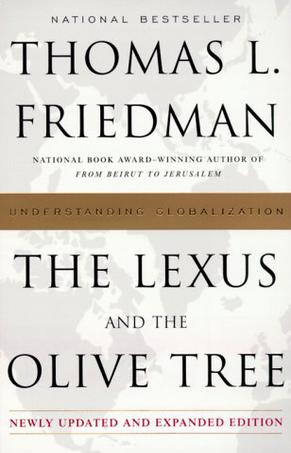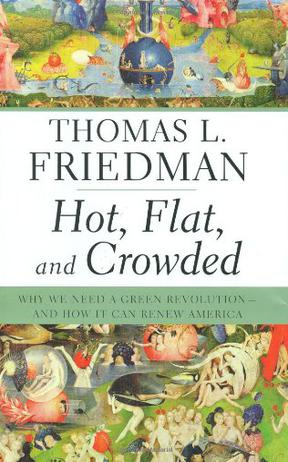-

The Lexus and the Olive Tree
在线阅读本书 From one of our most perceptive commentators and winner of the National Book Award, a comprehensive look at the new world of globalization, the international system that, more than anything else, is shaping world affairs today. As the Foreign Affairs columnist for The New York Times , Thomas L. Friedman has traveled the globe, interviewing people from all walks of contemporary life: Brazilian peasants in the Amazon rain forest, new entrepreneurs in Indonesia, Islamic students in Teheran, and the financial wizards on Wall Street and in Silicon Valley. Now Friedman has drawn on his years on the road to produce an engrossing and original look at globalization. Globalization, he argues, is not just a phenomenon and not just a passing trend. It is the international system that replaced the Cold War system; the new, well-greased, interconnected system: Globalization is the integration of capital, technology, and information across national borders, in a way that is creating a single global market and, to some degreee, a global village. Simply put, one can't possibly understand the morning news or one's own investments without some grasp of the system. Just one example: During the Cold War, we reached for the hot line between the White House and the Kremlin--a symbol that we were all divided but at least the two superpowers were in charge. In the era of globalization, we reach for the Internet--a symbol that we are all connected but nobody is totally in charge. With vivid stories and a set of original terms and concepts, Friedman offers readers remarkable access to his unique understanding of this new world order, and shows us how to see this new system. He dramatizes the conflict of "the Lexus and the olive tree"--the tension between the globalization system and ancient forces of culture, geography, tradition, and community. He also details the powerful backlash that globalization produces among those who feel brutalized by it, and he spells out what we all need to do to keep the system in balance. Finding the proper balance between the Lexus and the olive tree is the great drama of he globalization era, and the ultimate theme of Friedman's challenging, provocative book--essential reading for all who care about how the world really works. -

Hot, Flat, and Crowded
在线阅读本书 Thomas L. Friedman’s no. 1 bestseller The World Is Flat has helped millions of readers to see globalization in a new way. Now Friedman brings a fresh outlook to the crises of destabilizing climate change and rising competition for energy—both of which could poison our world if we do not act quickly and collectively. His argument speaks to all of us who are concerned about the state of America in the global future. Friedman proposes that an ambitious national strategy— which he calls “Geo-Greenism”—is not only what we need to save the planet from overheating; it is what we need to make America healthier, richer, more innovative, more productive, and more secure. As in The World Is Flat , he explains a new era—the Energy-Climate era—through an illuminating account of recent events. He shows how 9/11, Hurricane Katrina, and the flattening of the world by the Internet (which brought 3 billion new consumers onto the world stage) have combined to bring climate and energy issues to Main Street. But they have not gone very far down Main Street; the much-touted “green revolution” has hardly begun. With all that in mind, Friedman sets out the clean-technology breakthroughs we, and the world, will need; he shows that the ET (Energy Technology) revolution will be both transformative and disruptive; and he explains why America must lead this revolution—with the first Green President and a Green New Deal, spurred by the Greenest Generation. Hot, Flat, and Crowded is classic Thomas L. Friedman—fearless, incisive, forward-looking, and rich in surprising common sense about the world we live in today. -

That Used to Be Us
America has a huge problem. It faces four major challenges, on which its future depends, and it is failing to meet them. In That Used to Be Us, Thomas L. Friedman, one of our most influential columnists, and Michael Mandelbaum, one of our leading foreign policy thinkers, analyze those challenges—globalization, the revolution in information technology, the nation’s chronic deficits, and its pattern of energy consumption—and spell out what we need to do now to rediscover America and rise to this moment. They explain how the end of the cold war blinded the nation to the need to address these issues. They show how our history, when properly understood, provides the key to addressing them, and explain how the paralysis of our political system and the erosion of key American values have made it impossible for us to carry out the policies the country needs. They offer a way out of the trap into which the country has fallen, which includes the rediscovery of some of our most valuable traditions and the creation of a new, third-party movement. That Used to Be Us is both a searching exploration of the American condition today and a rousing manifesto for American renewal. “As we were writing this book,” Friedman and Mandelbaum explain, “we found that when we shared the title with people, they would often nod ruefully and ask: ‘But does it have a happy ending?’ Our answer is that we can write a happy ending, but it is up to the country—to all of us—to determine whether it is fiction or nonfiction. We need to study harder, save more, spend less, invest wisely, and get back to the formula that made us successful as a country in every previous historical turn. What we need is not novel or foreign, but values, priorities, and practices embedded in our history and culture, applied time and again to propel us forward as a country. That is all part of our past. That used to be us and can be again—if we will it.” -

From Beirut to Jerusalem